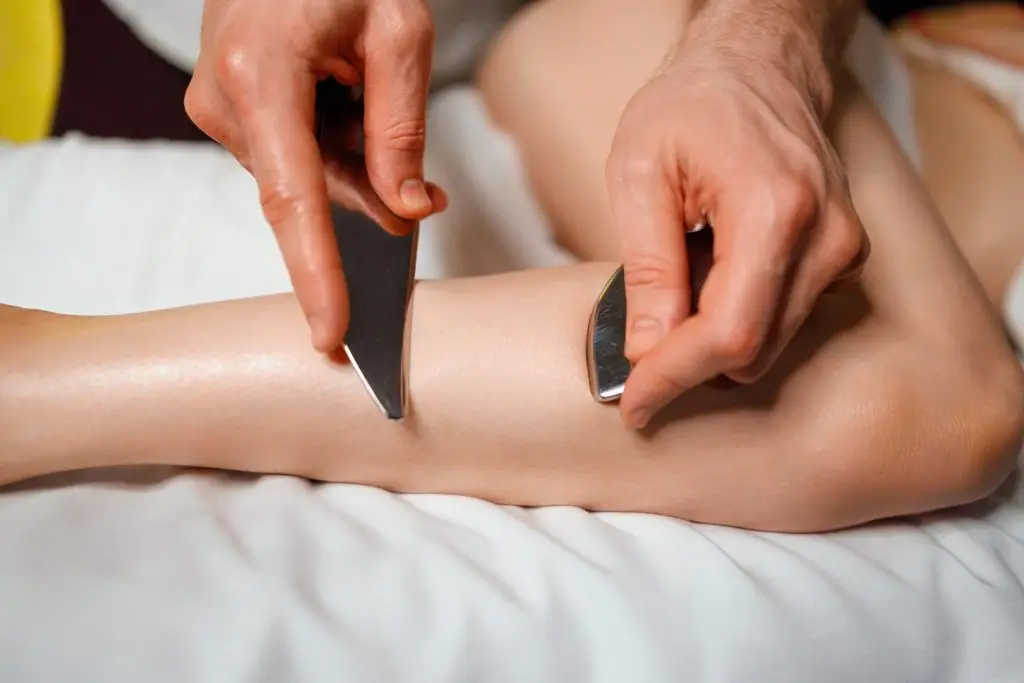Are sore muscles or stubborn tension holding you back from reaching your full potential? For athletes, fitness enthusiasts, and anyone grappling with chronic tension, IASTM may be able to enhance mobility and improve your quality of life.
By manually stimulating areas of tension, soreness, or scar tissue, IASTM helps improve mobility and enhances quality of life. If you’re tired of being held back by pain or stiffness, IASTM might be the key to unlocking a more active, comfortable lifestyle.
What is IASTM?
IASTM stands for instrument-assisted soft tissue mobilization. It’s a technique used by physical therapists to treat multiple kinds of soft tissue dysfunction through physically manipulating, pressing, and stretching the area with special devices.
But IASTM is not just a massage. It goes beneath the surface level, targeting muscles, tendons, and fascia with precision thanks to the purpose-built instruments used by the physical therapist.
The distinctive IASTM instruments are stainless steel or plastic tools that allow therapists to apply controlled pressure to affected areas, breaking down capillaries and scar tissue to promote healing and tissue regeneration. The technique is precise due to the number of IASTM instruments with varying shapes, sizes, and contours, allowing therapists to target specific areas with minimal discomfort.
Conditions we treat with IASTM
IASTM is versatile, addressing a variety of conditions. While it can be used alone, it’s most effective when combined with a comprehensive physical therapy plan. This holistic approach strengthens and mobilizes tight areas while promoting healing. These are some common conditions we treat with IASTM:
- Tendonitis or tendinopathy: Chronic inflammation of tendons can hinder performance and cause pain. IASTM helps reduce inflammation and stimulate healing.
- Muscle strains: Whether from overuse or acute injury, strained muscles benefit from IASTM’s targeted approach.
- Scar tissue: After surgery or injury, scar tissue can limit range of motion. IASTM breaks down scar tissue, promoting flexibility and function.
What to expect from your IASTM appointment
During your first appointment for IASTM, your therapist will begin by assessing your condition and discussing your goals. The treatment itself involves gliding the IASTM tool over your skin, focusing on areas of tension, fibrosis (scar tissue), and soreness. You might feel some discomfort, similar to the sensation of rolling out sore muscles, but it’s generally well-tolerated. After the session, you’ll receive at-home care instructions, which may include stretching and exercises to enhance results.
The day after each appointment, you can expect to feel as though you’ve had a rigorous workout previous day. Soreness, redness, and some bruising are common but temporary side effects. These effects are signs that your body is healing and adapting. We recommend at least two sessions per week with results becoming apparent after three to four weeks.
Get started with IASTM therapy for chronic soreness
IASTM is an empowering technique that offers significant benefits for those with chronic tension or reduced range of motion. By incorporating IASTM into your physical therapy plan, you can experience improved mobility, reduced pain, and enhanced quality of life. If you’re ready to take the next step, get the conversation started by calling one of our nearby clinics or requesting your first appointment online.

